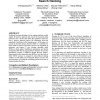Free Online Productivity Tools
i2Speak
i2Symbol
i2OCR
iTex2Img
iWeb2Print
iWeb2Shot
i2Type
iPdf2Split
iPdf2Merge
i2Bopomofo
i2Arabic
i2Style
i2Image
i2PDF
iLatex2Rtf
Sci2ools
125
click to vote
CIKM
2009
Springer
2009
Springer
A general magnitude-preserving boosting algorithm for search ranking
Traditional boosting algorithms for the ranking problems usually employ the pairwise approach and convert the document rating preference into a binary-value label, like RankBoost. However, such a pairwise approach ignores the information about the magnitude of preference in the learning process. In this paper, we present the directed distance function (DDF) as a substitute for binary labels in pairwise approach to preserve the magnitude of preference and propose a new boosting algorithm called MPBoost, which applies GentleBoost optimization and directly incorporates DDF into the exponential loss function. We give the boundedness property of MPBoost through theoretic analysis. Experimental results demonstrate that MPBoost not only leads to better NDCG accuracy as compared to state-of-the-art ranking solutions in both public and commercial datasets, but also has good properties of avoiding the overfitting problem in the task of learning ranking functions. Categories and Subject Descript...
Related Content
| Added | 26 May 2010 |
| Updated | 26 May 2010 |
| Type | Conference |
| Year | 2009 |
| Where | CIKM |
| Authors | Chenguang Zhu, Weizhu Chen, Zeyuan Allen Zhu, Gang Wang, Dong Wang, Zheng Chen |
Comments (0)

